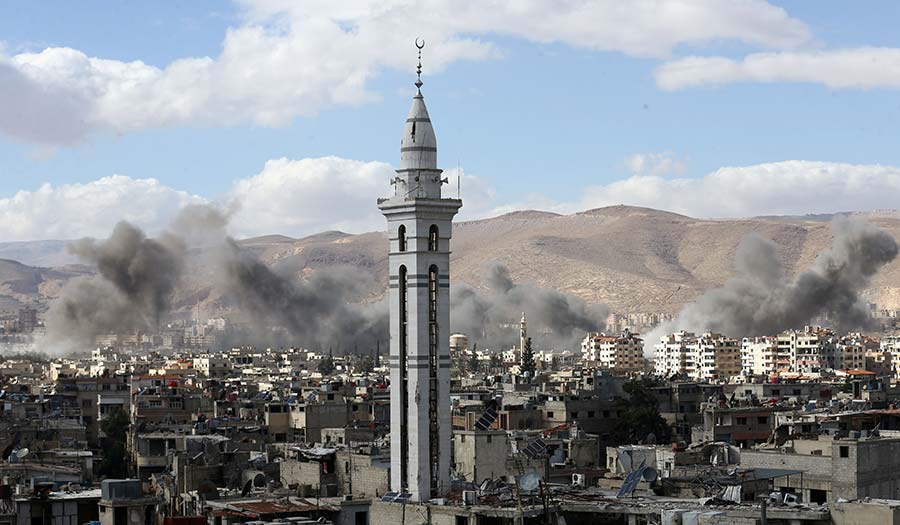 Reuters/Bassam Khabieh
Reuters/Bassam Khabieh
World News Desk
Learn the why behind the headlines.
Subscribe to the Real Truth for FREE news and analysis.
Subscribe NowAMMAN (Reuters) – What started as peaceful protests against President Bashar Assad’s rule in Syria has spiraled into a decade-old, multi-sided conflict that has sucked in neighbors and world powers and caused the largest displacement crisis since World War II.
As Mr. Assad prepares for a fourth term in office, here is a summary of the human and financial cost of the conflict according to data from United Nations bodies, international NGOs and Syrian civil society groups.
The Human Toll
• Death count and detainee estimates:
The Syrian Network for Human Rights (SNHR), which has been documenting the war from outside Syria and briefs UN agencies, has documented 227,749 civilians who were killed from March 2011 until now. This figure includes only documented civilian deaths, while researchers estimate another 250,000 combatants from all sides have also been killed.
The figures are broadly in line with estimates by rights groups and UN-commissioned investigators. They say Syrian and Russian bombing and Iran-backed militias were responsible for the bulk of civilian deaths.
Syria’s prisons hold tens of thousands of detainees. Many have been arbitrarily detained for participating in peaceful protests or for expressing dissenting political opinion, according to Human Rights Watch and Amnesty International.
SNHR has documented 149,361 political detainees, of whom 101,678 remain missing. Those figures match estimates by groups such as Human Rights Watch and Amnesty.
• Refugees and displacement:
Half the Syrian population, which stood at 23 million at the start of the conflict, have been forced to flee their homes, UN bodies say.
Of those, 5.5 million are living as refugees in the region, mostly in Turkey, the UN’s refugee body UNHCR says. Hundreds of thousands more are scattered across 130 countries, while 6.7 million have been displaced inside the country, including an estimated 2.5 million children.
Damage Assessment and Hardship
• Losses:
The UN’s ESCWA agency estimated physical capital destruction at $117.7 billion and the economic damage in terms of lost GDP (Gross Domestic Product) at $324.5 billion—putting the cost of the conflict at about $442.5 billion.
The report also cites official data which showed by the end of 2018 real GDP had lost 54 percent of its pre-conflict level.
The World Bank has estimated cumulative GDP losses from 2011 to 2016 at $226 billion and warned that the longer the conflict lasts, the more difficult recovery will be as losses become more persistent over time.
• Battered economy:
Syria’s economy is in its worst state since the start of the conflict and economists say the challenge is to stop it deteriorating further. Many industrialists have fled to Turkey, Lebanon and Jordan.
In the past year alone, the Syrian pound has lost three quarters of its value while the cost of food and essential items has rocketed by more than 200 percent, according to the World Bank.
The COVID-19 pandemic has made an already dire situation worse, analysts say.
Syrians have suffered a dramatic reduction in purchasing power and rising levels of debt, leaving millions incapable of putting food on the table and meeting their basic needs.
• Poverty and worsening conditions:
Today, over 13 million Syrians require humanitarian and protection assistance and almost 90 percent of the population lives in poverty, according to UN and Western relief agencies.
UK based aid group World Vision International said this year a child’s life expectancy in Syria has been reduced by 13 years.
- Real Truth Magazine Articles
- ANALYSIS
 10 Years Later: Is Another Arab Spring Coming?
10 Years Later: Is Another Arab Spring Coming?
Other Related Items:
More on Related Topics:
- IAEA Chief: Iran Is Poised to ‘Quite Dramatically’ Increase Stockpile of Near Weapons-grade Uranium
- What Is Blocking a Ceasefire Between Israel and Hezbollah?
- UN Nuclear Agency’s Board Condemns Iran for the 2nd Time This Year for Failing to Fully Cooperate
- Traumatized by War, Hundreds of Lebanon’s Children Struggle with Wounds Both Physical and Emotional


